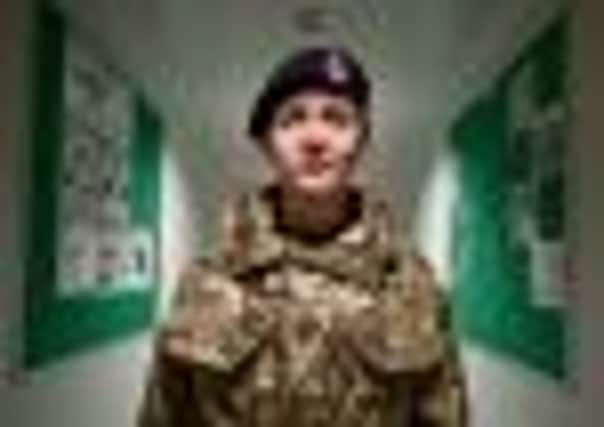TV preview: Our Girl | Foyle’s War


OUR GIRL
Tomorrow, BBC1, 9pm
FOYLE’S WAR
Tomorrow, STV, 8pm
Yeah, these yobs puking up in shop doorways, bring back National Service, that’ll sort them out.
But this, thankfully, is a much more subtle drama than that. For one thing, it stars the luminous Lacey Turner, who is quite simply one of the best young TV actresses to emerge in years. I would say I’d watch her reading the phone book, but even more than that, I’ve watched her in that terrible string of storylines she got towards the end of her run as Stacey Slater in East- Enders: when she was fighting with Janine over that dreary Ryan, or that perennial soap dilemma, whose baby did she have?
Advertisement
Hide AdSince leaving the soap she’s kicked around a bunch of random projects. But it’s clearly been just a matter of time before she landed something big that proves she can cut it outside soaps. And Our Girl is it: Turner’s likeable presence and big-eyed vulnerability, coupled with that knowing twist of cynicism, makes her character Molly Dawes more than a cliché.
You believe that she has the objectivity to look at her life and see it settling into a pattern: like her mother’s, pregnant with her umpteenth child, living with kids and snarling husband in a small flat (Kerry Godliman, fresh from Derek, but more real here); like her mates, whose ambitions stretch as far as sneaking drink into a club. Molly is not that different from Stacey Slater, but that shop she vomits outside is an army recruitment centre. It gives her an idea.
Rookie goes through training is an old story – even the female version has been told in Private Benjamin, GI Jane etc. Our Girl hits the usual marks, as the stroppy Molly comes up against the regimented discipline of the Army. But the other thing that marks it out is that the drama stops to question why the training is like that and whether the Army breaks people down to rebuild them. It shows that at least some people join because they don’t have any other way to change the script of their lives. And, importantly, it is clear-eyed about telling that story in a time when British soldiers are still dying and being maimed every month. It suggests that for some people the risk is a price worth paying. But it never suggests that there isn’t a risk.
At 90 minutes, Our Girl can’t cover everything, so there are a few corny plot shortcuts. But it’s an interesting, unsettling drama whatever your view of the military, or war, with a vivid central performance and good supporting cast.
More comfortingly, back to an earlier war, where things – at least from this distance – seem simpler. Foyle’s War writer Anthony Horowitz could be forgiven for feeling aggrieved: being told a few years ago that cancellation was near, he skipped overly briskly through 1943 and ‘44 so that his hero could see VE Day. Now that the show has been revived due to public demand (and ITV desperation for a reliable ratings draw), he’s had to construct a plausible structure for his hero in the post-war years – although surely DCS Foyle must be due for retirement by now.
Last seen heading to the US to catch the one that got away, Foyle returns to be immediately drafted by the security services, who helpfully explain: “We have a new war now, a new enemy – George Orwell calls it the Cold War.”
Advertisement
Hide AdWhat’s that got to do with him? Well, it turns out that his erstwhile driver, Sam, is now suspected of being a traitor, which we all know cannot be true as she is the very definition of a jolly good egg. So he must clear her name, in the face of snooty spy people who say things like: “This isn’t a case of bodies in the library or stolen petrol coupons or whatever else you got up to in Hastings – it’s a different world.”
Sam’s husband has morphed into a different actor and intends to stand as an MP in London, where the series is now set. Gloomy sidekick Milner has been left behind in Hastings, but a gloomy demobbed former constable has turned up instead.
Advertisement
Hide AdMuch of the pleasure is in listening to posh voices discussing the rigours of rationing: “No salmon, no toilet paper, no Ovaltine and no soft fruit – apparently it’s all been used by the WI for jam.” “You’ve got more Spam ... I love Spam.” Yes, it’s clearly the result of a quick Google of “food available 1946” but the rhythms of Honeysuckle Weeks’ offhand, Celia Johnston accent is charming.
Michael Kitchen played Prince Charles about 20 years ago and the voice seems to have stuck; his dialogue is not so much delivered as diffidently dropped. His habit of sucking his lips and narrowing his eyes adds to the sense that he’s a dispassionate observer. I suspect this is part of the series’ appeal, beyond the nostalgia factor. You get awfully fed up with all the other shouty detectives – politeness is rather restful.
The plot, by the way, is a confusing affair about radiation and Russians, and takes a while to get going. As before, there is wonderful attention to period accuracy in the sets, but our heroes are remarkably unprejudiced in certain attitudes. But it’s good to see Foyle back all the same. Now, how about a second series for The Bletchley Circle? They can share the props.